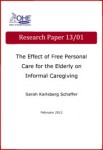Unlocking the Value of Combination Therapies



Debates about whether to increase state assistance to the elderly have included concerns that this could reduce the amount of care from such personal caregivers, producing a limited net benefit. In a new research paper released today, OHE’s Sarah Karlsberg…

Debates about whether to increase state assistance to the elderly have included concerns that this could reduce the amount of care from such personal caregivers, producing a limited net benefit. In a new research paper released today, OHE’s Sarah Karlsberg Schaffer undertakes a comprehensive analysis based on a “natural experiment”: the introduction of free personal care for the elderly that was implemented in Scotland in 2002, but not elsewhere in the UK.
Forecasters predict that the population of people aged 65+ will double in the UK by 2050, constituting a quarter of the total population. This will seriously challenge the ability of the NHS and the social care system to meet the health care needs of the elderly. The ageing population already is expensive—average NHS spending on 65+ households is nearly double that on households under 65 years of age. Formal care provided by the state, however, is not the only resource on which the elderly rely: England alone has nearly six million informal carers. Debates about whether to increase state assistance to the elderly have included concerns that this could reduce the amount of care from such personal caregivers, producing a limited net benefit.
In a new research paper released today, OHE’s Sarah Karlsberg Schaffer undertakes a comprehensive analysis based on a “natural experiment”: the introduction of free personal care for the elderly that was implemented in Scotland in 2002, but not elsewhere in the UK. Under The Community Care and Health (Scotland) Act, people aged 65 and over are entitled to a flat rate payment of £145 per week and those who receive care in a nursing home receive an additional £65 per week. These funds are separate from living and housing costs and are intended specifically for personal care.
In this study, Sarah uses individual-level data from the British Household Panel Survey to estimate the effects of the introduction of this policy change on informal care behaviour. The introduction of the Scottish policy actually increased the probability of supplying informal care by three to five percentage points, the study shows, suggesting that the two sources of care are complementary. Sarah points out that “ . . . free personal care in the home allowed more elderly people to stay in their own homes, [where] friends and family supplemented the formal care with care of their own.”
The Scottish policy is not without costs, however. Uptake of the payments has been high, the study notes, and costs have increased steadily. Whether the overall gains in care outweigh the costs is a topic for future research.
Download Schaffer, Sarah Karlsberg. (2013) The effect of free personal care for the elderly on informal caregiving. Research paper 13/01. London: Office of Health Economics.
For further information, please contact Sarah.
An error has occurred, please try again later.
This website uses cookies so that we can provide you with the best user experience possible. Cookie information is stored in your browser and performs functions such as recognising you when you return to our website and helping our team to understand which sections of the website you find most interesting and useful.
Strictly Necessary Cookie should be enabled at all times so that we can save your preferences for cookie settings.
If you disable this cookie, we will not be able to save your preferences. This means that every time you visit this website you will need to enable or disable cookies again.
This website uses Google Analytics to collect anonymous information such as the number of visitors to the site, and the most popular pages.
Keeping this cookie enabled helps us to improve our website.
Please enable Strictly Necessary Cookies first so that we can save your preferences!